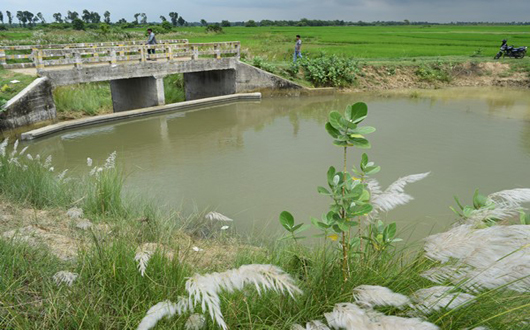RAJSHAHI, Sept 6, 2018 (BSS) – Canal water irrigation has been contributing
transplanted aman paddy in the high Barind tract.
Gausul Islam, 50, a farmer of Paharpur village under Godgari Upazila of
the district, said during the rainless condition, the farmers transplanted
paddy and subsequently protected it through using irrigation water from the
nearby Godagari canal.
“I have cultivated paddy on 15 bigha of land. Now, I am totally depended
on the canal water for transplanting and protecting the growing crop,” Islam
added.
Golam Hossain, 42, another farmer of Shibpur village under Tanore Upazila,
protected his paddy on five bigha of land from the rainless condition after
using water from Shibpur canal. He said canal water has become blessing for
many farmers in terms of surviving their transplanted paddy.
Another farmer Monsur Rahman, 47, of Bangsidhar village under the same
upazila has brought ten bigha of land under transplanted aman paddy
cultivation through using water from a nearby re-excavated canal.
Like them, around 7,500 other farmers cultivated paddy and other seasonal
crops and vegetables on 6,260 bigha of lands this season using canal water in
11 dry areas where conventional irrigation facilities have become ineffective
due to water-scarce condition.
In addition to construction of five check dams, 4.85-kilometer canals were
re-excavated with initiative of a development project titled “Integrated
Water Resource Management (IWRM)” with the main thrust of protecting crops
from any drought like situation. Union Parishad (UP) and respective community
extended five percent contribution each to the venture.
So far, the farmers used 22.60-crore liters water for the irrigation
purposes in Godagari, Badhair, Kalma and Daldali UPs under Godagari, Tanore
and Vholahat Upazilas, said Jahangir Alam Khan, assistant project
coordinator.
DASCOH Foundation and Swiss Red Cross have jointly been implementing the
IWRM project in drought-affected 39 UPs and three pourasabhas in Rajshahi,
Naogaon and Chapainawabgonj districts since 2015.
Jahangir Khan said IWRM project intends to build UPs as effective and pro-
people institution through farmers’ level sustainable water resource
management models amidst participation of local people.
Lutfor Haider Rashid Moina, chairman of Kalma UP, said he has re-excavated
2.5-kilometer derelict canals for rainwater conservation with financial and
technical support from IWRM project.
He also constructed two concrete check-dams in the canal and a big size
water reservoir so that the rainwater is conserved during monsoon for
providing irrigation to the nearby cropping fields.
Referring to various research findings, Professor Chowdhury SarwarJahan of
Department of Geology and Mining in Rajshahi University said around 3,000
liters of water needs to produce one kilogram of paddy.
Barind area’s irrigation system is largely dependent on underground water.
So, huge underground water is extracted for crop cultivation including paddy
every year.
Step should be taken to excavate and re-excavate all the existing derelict
ponds and canals for boosting uses of surface water for irrigation purposes.
The measures can be effective means of proper aquifer recharge.
Stressing the need for environment-friendly more irrigation schemes like
IWRM, he said there is no alternative but to promote surface water based
irrigation to protect the groundwater resources.



